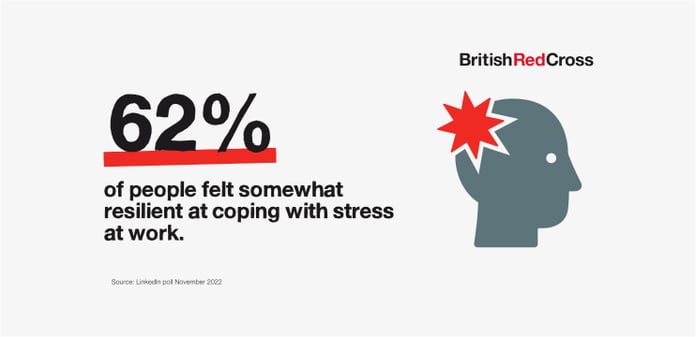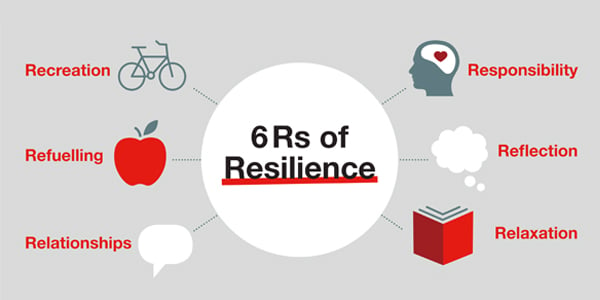Resilience and stress in the workplace are closely intertwined, with employees possessing higher levels of resilience being better prepared to manage challenging situations at work. In the context of workplace stress, resilience plays a crucial role. Take our quiz to assess your team's skills in recognising, handling, and recovering from difficult circumstances.
What is work-related stress?
Work-related stress is the response people may have when they are faced with the demands and pressures of work. If these demands and pressures are outside of their knowledge and abilities, it may result in challenging their ability to cope. A Red Cross Training LinkedIn poll from November 2022 found that 49% of followers have frequently felt stressed at work. An example of work-related stress could be when we are given a deadline that we don’t feel able to adequately achieve or are asked to take on more than we can manage. We may experience physical symptoms, such as a rapid heart rate and breathing, sweating and shaking, pain, feeling sick and/or tired.
Everyone needs a certain amount of stress or pressure to live well. It's what gets you out of bed in the morning and motivates you throughout the day. However, stress becomes problematic when there's too much or too little. We are all unique, so situations that stress one person can affect another person differently.
Ready to lead with empathy and awareness?
Our Mental Health Awareness for Managers course is ideal for managers and individuals responsible for navigating challenging situations in the workplace.
Why is resilience important in the workplace?
If a team can’t overcome setbacks and challenges, it can cause a financial and emotional impact. In 2022/23, 17.1 million working days were lost due to work-related stress, depression or anxiety. Stress is a common workplace experience that can negatively impact the productivity and mental health of your team.
Organisations allocate a large amount of budget and time to building the best teams. The latest Health and Safety Executive (HSE) report highlights 875,000 workers suffered from work-related stress, depression or anxiety in 2022/23. Hybrid working can also be a cause of stress, such as remembering to bring important items into work, and a lack of a daily routine. Professor Christine Grant, an occupational psychologist at the University of Coventry’s Centre for Healthcare Research said, “People may feel a pressure to keep on working, or want to keep on working, which impacts on their wellbeing.”
What is resilience in the workplace?
Resilience is a person’s ability to recover or ‘bounce back’ from a challenging situation. Being resilient doesn’t mean that you don’t experience stress or emotion. It means that when faced with adversity, trauma, or crisis you can cope and manage your mental health effectively.
Work can cause a lot of stress, but by building personal resilience both at work and home, it ensures that when something happens, you have the tools and resources to cope. A Red Cross Training LinkedIn poll found that 62% of people felt somewhat resilient at coping with stress at work.
Ready to strengthen your resilience?
Our Mental Health Awareness for Managers course is designed for leaders and individuals responsible for addressing challenging situations in the workplace.
What is the relationship between stress and resilience?
Stress and resilience are interconnected in the workplace. The relationship between resilience and stress means that employees with high levels of resilience are more equipped to deal with stressful situations at work such as heavy workloads, tight deadlines and difficult team relationships. They are also better able to bounce back from setbacks and adapt to workplace changes.
Employees with low levels of resilience may have difficulty with stressful situations at work and may be more susceptible to stress, anxiety and depression. They may also struggle to adapt to workplace changes and be more resistant to new ideas.
What are the main work-related stressors?
There are main causes of stress in the workplace, and they can include: organisational culture, bad management practices, workload, physical work environment, relationships at work, changes in management, lack of support, role conflict and trauma.
Causes of workplace stress:
- long hours
- workload
- organisational changes
- deadlines
- changes to job description
- lack of autonomy
- uninteresting tasks
- insufficient skills for the job
- over-supervision
- inadequate working environment
- lack of proper resources
- lack of equipment
- few promotional opportunities
- harassment
- discrimination
- poor colleague relationships
- crisis incidents.

Why build a resilient team?
Resilient teams can manage the inevitable difficulties of project and organisational life. They can work together to support each other through change and conflict and can bounce back. A certain amount of stress is required for motivation and focus. Leaders can help their team become more resilient when faced with stress while minimising the impact on their emotional, mental, and physical wellbeing.
Change is inevitable, and resilient teams have the skills to plan resources, to consistently bounce back stronger from challenges. The future of successful teams will depend not only on talent and strategy, but how they work together to handle pace and stimulation that is unlikely to slow down.
Teams and organisations experience many external pressures that cannot be controlled and a non-resilient team will focus on this. However, a resilient team will focus on the things that can be influenced and changed.
Ready to cultivate a resilient team?
Equip your team to navigate change, conflict, and stress effectively. Learn more about our Mental Health Awareness for Managers course now.
How can employers build resilience at work?
The 6 Rs of resilience can help people to prepare so that they are better able to bounce back when faced with a difficult situation. These are positive steps that you can take to feel more in control of the situation. They are most effective when used inside and outside of workplace situations.

While every organisation is different, these steps are likely to be helpful:
- Responsibility: organisations have a duty of care to employees, but individuals should be encouraged to take personal responsibility for their own mental health, wellbeing, and resilience.
- Reflection: reflecting on how a person is, what is happening and how they are feeling about things.
- Relaxation: relaxing in a way that suits an individual e.g. exercising, reading or practising mindfulness.
- Relationships: building supportive relationships with friends, family, or a partner. Knowing who to turn to in difficult times.
- Refuelling: eating a healthy diet and being aware of alcohol intake.
- Recreation: taking regular exercise and doing enjoyable activities.
Make a positive difference in your workplace
Our range of face-to-face, virtual and online Mental Health at Work courses features the Mental Health Awareness for Managers course. This course is ideal for people managers and individuals who may be responsible for dealing with challenging situations in the workplace.
The course helps leaders understand the relationship between resilience and stress, gain an awareness of mental health problems, and develop skills for leading a resilient team.
Topics: Stress, Resilience, Mental Health at Work, Mental Health Awareness







